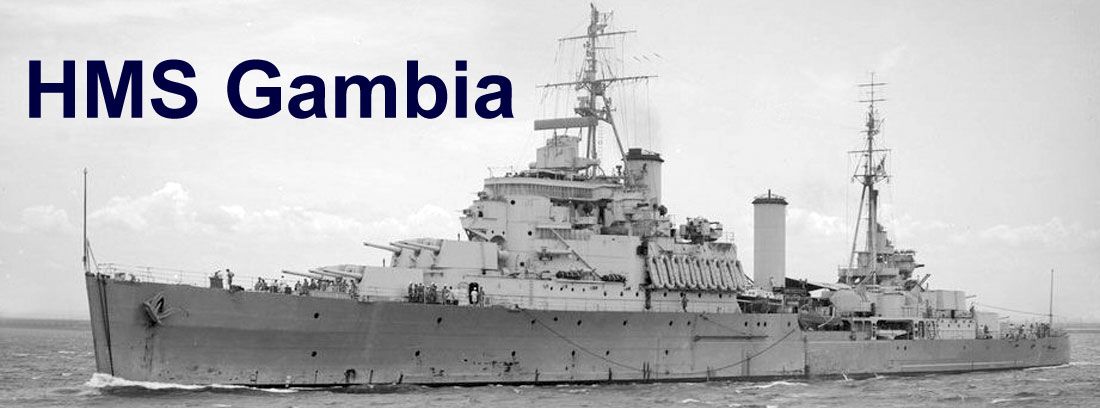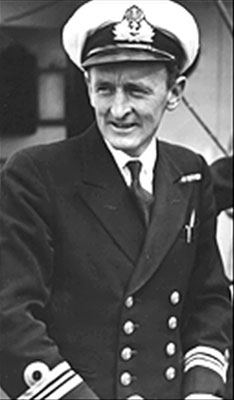
Brian Edmund Turner, OBE, DSC, USA Legion of Merit
 Brian Turner was born in Parnell, Auckland, New Zealnd and joined the Royal New Zealand Navy Volunteer Reserve at 18 as an ordinary seaman in 1933, and was mobilised as a petty officer on the outbreak of World War II in 1939.
Brian Turner was born in Parnell, Auckland, New Zealnd and joined the Royal New Zealand Navy Volunteer Reserve at 18 as an ordinary seaman in 1933, and was mobilised as a petty officer on the outbreak of World War II in 1939.
He served on patrol boats and minesweepers operating out of Auckland. In 1941, he was commissioned into the RNZNVR and travelled to Australia for courses and on completion of those again served in patrol vessels in New Zealand. He specialised in gunnery and was posted to HMNZS Gambia for the final year of the war.
Commodore Turner returned Gambia to the United Kingdom and then transferred to HMNZS Bellona on her first commissioning in the RNZN in 1946. Later that year he received a permanent commission in the Navy in 1946. He was given command of the corvette HMNZS Arbutus and later that year became commanding officer of the frigate HMNZS Kaniere.
After a spell ashore as First Lieutenant of Philomel, in 1950, Commander Brian Turner assumed command of the frigate HMNZS Rotoiti for her tour of duty with the United States naval forces in Korea during hostilities there and it was here that Commander Turner had his most exciting times.
The British freighter Hupeh was on its regular run from Tientsin in China to Hong Kong when she was boarded by pirates and the 20 passengers taken hostage.
The Rotoiti found the Hupeh and chased her through the night, eventually forcing the pirates to give up the ship.
Commander Turner restored the Hupeh to her crew, put the pirates on an island, and the passengers were safely landed in Hong Kong. For his part Turner was awarded a DSC (Distinguished Service Cross).
His efforts were rewarded with the Legion of Merit, signed by the US President, Dwight D. Eisenhower. In part, the citation reads:
Displaying outstanding seamanship and aggressiveness throughout this period, Commander Turner patrolled the lower Han River, controlling the water approaches to Seoul, and effectively protected the left flank of the Eighth Army on Kimpo Peninsula against enemy amphibious attack.
Although exposed to the constant navigational dangers of strong currents and shifting channels, and frequently within range of active enemy guns and mortar fire, he ably manoeuvred his vessel through restricted waters and executed harassing attacks against enemy ground forces.
After the Korean War Turner was appointed drafting officer at the Navy's training base in Auckland, HMNZS Philomel, ending up as director of naval recruiting. In 1955 he became the Royal New Zealand Naval Liaison Officer in the United Kingdom and took a major part in the organisation for purchase of the cruiser HMNZS Royalist and the first two modern frigates, HMNZS Otago and Taranaki.
He was promoted to captain in 1957, the same year he was awarded the Order of the British Empire (OBE). Commodore Turner became the Captain superintendent of the Dockyard in Auckland in 1958, attended a U.S. Naval War College in 1962, commanded HMNZS Royalist. On promotion to Commodore in 1964 became the Second Naval Member of the Naval Board, effectively third in the board's hierarchy, and chief of naval personnel.
He retired from the Navy in 1966. Brian becamse involved in the British New Zealand Trade Council and past president, Warwick Barraclough, wrote that:
Brian Turner was a dedicated, long standing secretary of the British New Zealand Trade Council when he retired in 1992 after more than 10 years service and at that year's annual meeting he was elected a life member. In nominating Brian for this honour it was stated: "Without Brian's personality, discipline, efficiency and dedication during a difficult period in the council's history, BNZTC may not have survived". Brian was a retired naval officer, a gentleman and very dedicated to the New Zealand-British relationships the council promotes.
Brian returned to Parnell, living in a flat and running the resident's association.
He passed away aged 89, on March 9, 2005 and was survived by his three sons, Richard, Rodney and Stephen, and their families.